All right, for those not in the know, here's a description of OpenCourseWare from the project's About page:
What is MIT OpenCourseWare?
MIT OpenCourseWare is a free publication of MIT course materials that reflects almost all the undergraduate and graduate subjects taught at MIT.
- OCW is not an MIT education.
- OCW does not grant degrees or certificates.
- OCW does not provide access to MIT faculty.
- Materials may not reflect entire content of the course.
So, in essence, they're putting up (almost) all their course material online, for the general public to view and download.
And they have a huge range of courses too, somewhere in the region of 1800 different courses.
All right, now hands up, those who thought, "Hey cool. Why doesn't NUS have something like that?" Good question, really. I have no idea. Of course, if NUS does indeed have something like MIT's OpenCourseWare, then this post is all hot air, so feel free to flame me in the comments. =)
Otherwise though, it does seem for now that NUS' course material exists in the walled and gated garden of IVLE. Oh wait, it's not even a garden where you can roam around freely after you're past the gates. I think, maybe.. dungeon.. is more the appropriate word. With securely segregated cells into which nobody may enter without explicit permission. Have you faced this situation before? You'd like to check out the course material for a module that you're not taking at this particular moment, but when you try to access its Workin on IVLE, but all you get is a sign saying you do not have access rights to view its contents. All right, that was helpful.
I'm not sure I understand the restriction of access to course materials though, especially to students of NUS. I had the impression that Universities were institutes of learning, and exploration, and not of restriction. Even if course material is not opened to the public like MITs OpenCourseWare (which, I guess, would be the ideal scenario), why are students restricted from viewing course materials by default? In an article on ZDNet Asia, dated 20 Febuary 2008, Ravi Chandran of the Centre for Instructional Technology here at NUS mentioned that the University left it to the lecturers to make the decision on whether or not to open up their course material, citing a "bottom-up approach". And indeed, certain lecturers do have their course materials listed on the open web (CS2105: Introduction to Computer Networks, was actually the only one I found in a short survey of about 10 module pages. Eg. http://www.comp.nus.edu.sg/~cs2105). Also in the article, Chandran mentions that, "while laudable, open education appears to be more advantageous for educators, who [can] now reference other material while developing course material. Students... may not fully experience the learning by just downloading content from the Web". He also expressed concern that learners may face difficulties in discerning the "authenticity or accuracy" of said material. But surely, even if you may not have the lecturer standing in front of you, it helps to be able to reference the material as and when you need it? I presume, as University students, we don't exactly need our lecturers to spoonfeed us if we are to learn. Besides, if the material were published on an established source, for example, on the University's OpenCourseWare project page, from the University's lecturers, I guess, just maybe, we as students, could put a little trust in the "authenticity and accuracy" of that material?

Screenshot of the CS2105 public webpage
In this day and age, I (to the best of my knowledge, at least. I acknowledge the fact that there may be factors at play of which I am ignorant) see no reason why educational material should be kept under lock and key, or in IVLE's case, user-id and password. I have heard it mentioned that course material like lecture notes are not freely distributed due to issues of intellectual property rights. But what intellectual property are we talking about here? Are there concepts discussed in the notes that have been invented by NUS teaching staff but have not been published in a public, peer-reviewed journal? If not, why the secrecy? I guess the claim about protecting intellectual property rights is valid if there was licensed content bought from other providers and used in lecture notes, to which NUS or its teaching staff do not have the rights. After all, even the MIT OpenCourseWare page states that material on the site "may not reflect the entire content of the course". Apart from that, however, I make the assumption that most, if not all, the concept taught in lectures are public knowledge anyway, and there should therefore be no reason to restrict access to them.
So here's a hope for the future: that course material for NUS modules will eventually be put up one day in a fashion similar to MIT's OpenCourseWare. After all, if we would like to make the claim that we are a world class institution, I guess it wouldn't hurt to take a page out of MIT's book?
--
For more information regarding the OpenCourseWare and other similar initiatives, here are a few resources that might be handy:
- OpenCourseWare Consortium (OCW Consortium members list)
- Free CS robotics course from Stanford University
- The Open Knowledge Foundation (Project list)
- The Open Knowledge Definition
- The Open Source Initiative
So yup, once again, if I've missed out on anything, do feel free to point me in the correct direction in the comments.
- Ruiwen





No comments:
Post a Comment